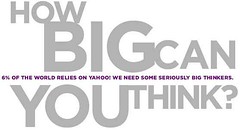
At the 2nd of the lectures in the Yahoo Big Thinker Series, which happened yesterday at the Hotel Leela, Dr. David Pennock talked on how the internet and search engines have developed and are developing to make the economy more automated.
http://bangalore.yahoo.com/bigthinkers/events_09/event_june12_09.html
David is Principal Research Scientist at Yahoo. More about David is here:
http://research.yahoo.com/David_Pennock
What David discussed was about how search engines have evolved from being just word searchers to being auctioneers for what people are searching.
There are people who are willing to sell products, services and information, other people are searching. One of the key areas that David talks about is Continuous Double Auction.
Prediction market utilising CDA was also discussed. weatherbill.com gives insurance to customer against bad weather, and the cost of which is calculated based on the prediction that the customer does. There are levels of severity of prediction that can be chosen from, and the website provides options to calibrate your prediction.
Intrade.com is another success e-commerce that is based on predictions. You trade the predictions about events happening around the world, you can buy and sell them based on what your current take on them is. To know about how it works ->
http://www.intrade.com/jsp/intrade/help/index.jsp?page=howitworks.html
A variety of questions were raised as to would this really work, if someone trades on a prediction like
"Would terrorists attack on ___ time?".
Such kind of predcitions themselves are not worth enough to trade about.
But the amount of intel such a model generates is enormous. Karthikeyan Iyer ( Director, Crafitti Consulting Pvt Ltd, www.crafitti.com ) asked me how would one monetize such kind of a model.
The prediction market is generating info about what is the current mind set of people and whether the prediction that is in hand is on the right lines of not.
Take an example : A hybrid car which generates more power than it
consumes will be ready in an economically viable state by 2015
consumes will be ready in an economically viable state by 2015
The amount of response to this prediction gives a rough estimate how many people like this idea. If the P-value is > 50% it means there are fair chances of people buying such a product and companies like Toyota, Honda can basically utilise this intel to know where there target markets are.
Take another example : A Red coloured shampoo which is not harmful,
if eaten accidentally, will be a big hit
if eaten accidentally, will be a big hit
Now clearly an example of radically different idea that can be worked upon, especially from the point of view of children. But if the market is not positive about this prediction, this might be because of any of the things -> color, edible nature etc. This is a simple example, but complex predictions can be formulated to make sure that the intel generated is good enough to find out if a particular product is viable or not.
________________________________________________________
Point to ponder :
How prediction market concept can be utlized inside organisations to improve productivity of processes as well as employees?
________________________________________________________
P.S.:
See the image at the top of the post.
Me and my friend Vishal were discussing about the various interpretations of it when this is what came up:
How big can YOUTH INK?
________________________________________________________






1 comment:
thanx for the information
Post a Comment